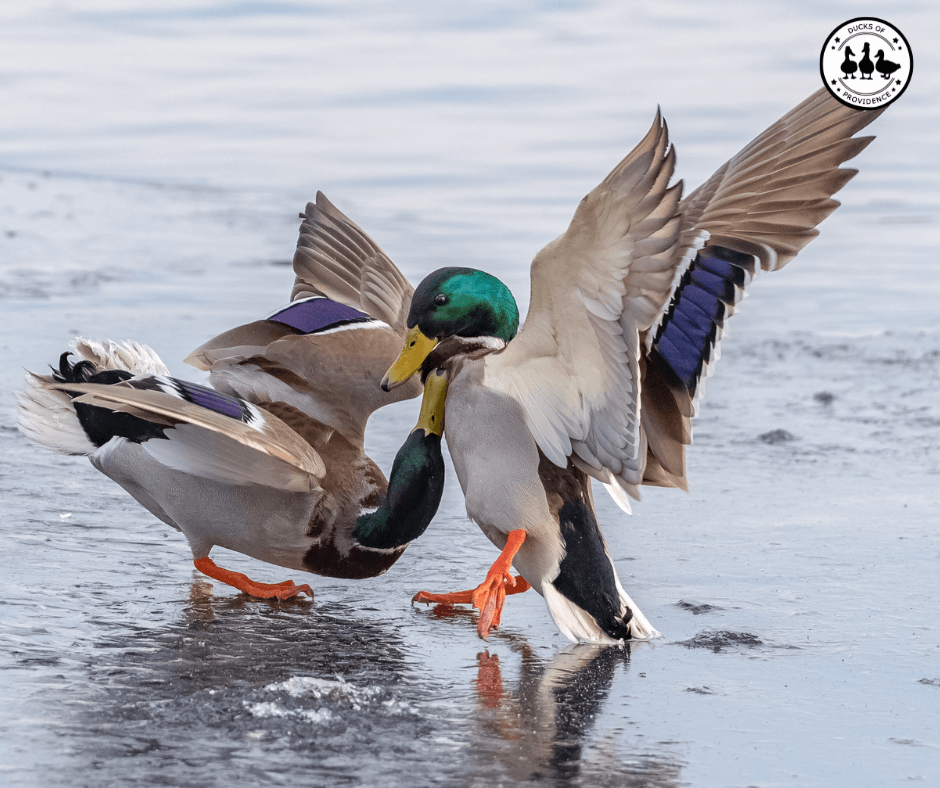
Aggressive Ducks: How do I stop my ducks from fighting?
Last updated on January 15th, 2026 at 01:45 pm
Dealing with aggressive ducks can be a challenge, but understanding the root cause of their behavior and addressing it thoughtfully can help restore peace in your flock. Here’s a guide to help you stop your ducks from fighting.
Ducks of Providence is free, thanks to reader support! Ads and affiliate links help us cover costs—if you shop through our links, we may earn a small commission at no extra cost to you. Thanks for helping keep our content free and our ducks happy! 🦆 Learn more
Why Are Ducks Aggressive?
Ducks can exhibit aggressive behaviors for various reasons, many of which stem from natural instincts or environmental factors. Aggression can sometimes escalate into bullying, where certain ducks consistently target weaker members of the flock. Understanding the causes behind these behaviors is essential to restoring harmony. Let’s explore the reasons ducks may become aggressive:
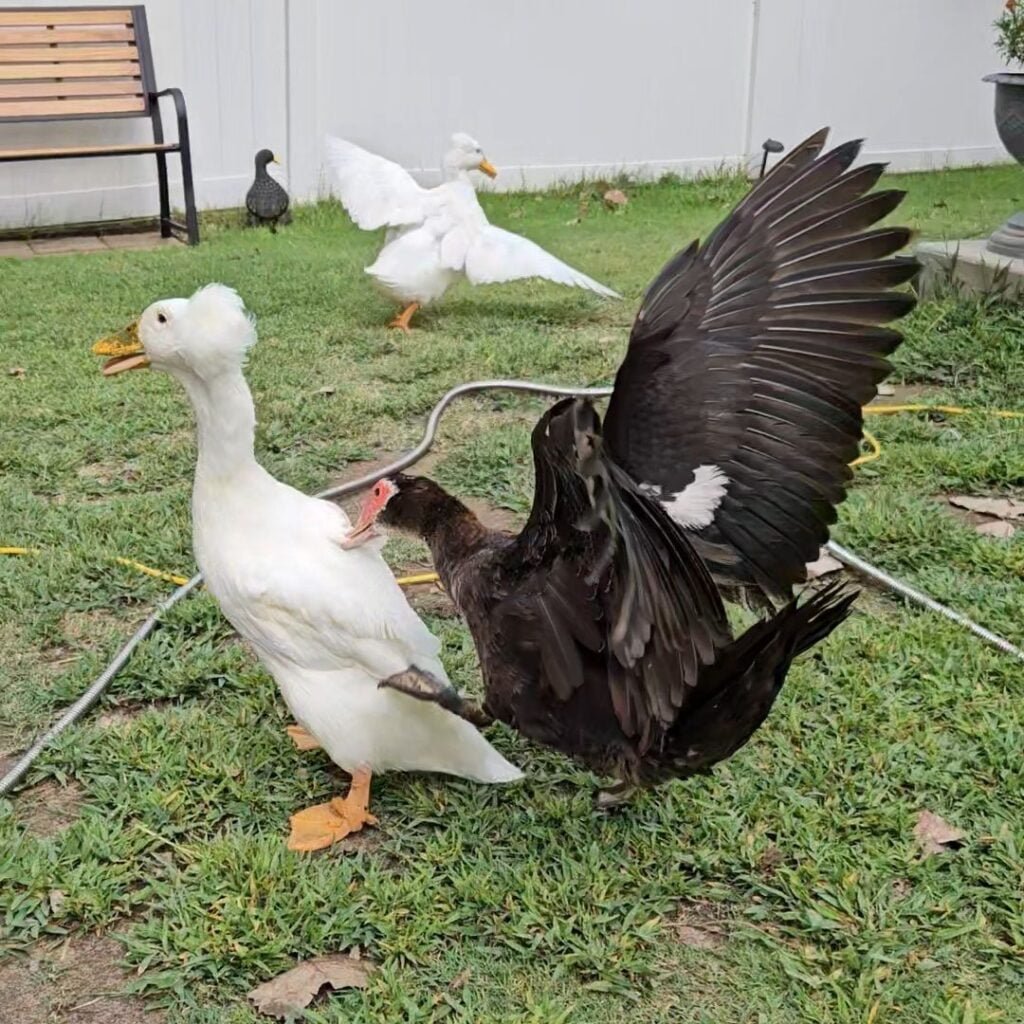
1. Establishing the Pecking Order
Like many social animals, ducks rely on a hierarchy to maintain order within their group. This hierarchy is called the pecking order, and it involves ducks asserting dominance through behaviors such as chasing, pecking, or even fighting.
- When it happens: Aggression is most common when new ducks are introduced, as the flock works to integrate the newcomers.
- Signs: Dominant ducks may chase others away from food, water, or resting spots. New or younger ducks might be isolated or bullied as they try to find their place in the hierarchy.
- Why it matters: While this is a natural process, prolonged aggression or severe injuries might require intervention.
2. Bullying Behavior
Sometimes, aggression goes beyond establishing the pecking order and turns into persistent bullying. This happens when one or more ducks consistently target a weaker or smaller flock member.
- Why it happens: Bullying often stems from differences in size, health, or age. Younger ducks or those with injuries are particularly vulnerable, as they’re seen as easy targets.
- Signs of bullying: A bullied duck may be chased relentlessly, excluded from feeding or water stations, and exhibit signs of stress, such as feather loss or lethargy.
- The impact: Bullying can lead to severe physical and emotional stress, which weakens the duck’s immune system and makes them more susceptible to illness.
3. Breeding Season Hormones
During breeding season, male ducks, or drakes, often exhibit heightened aggression due to increased testosterone levels.
- What’s happening: Drakes may fight each other for dominance or access to mates, and females may become victims of over-mating.
- Impact on the flock: If the male-to-female ratio is unbalanced (ideally 1 drake to 4–6 females), aggression can spiral into persistent bullying of certain flock members, particularly females.
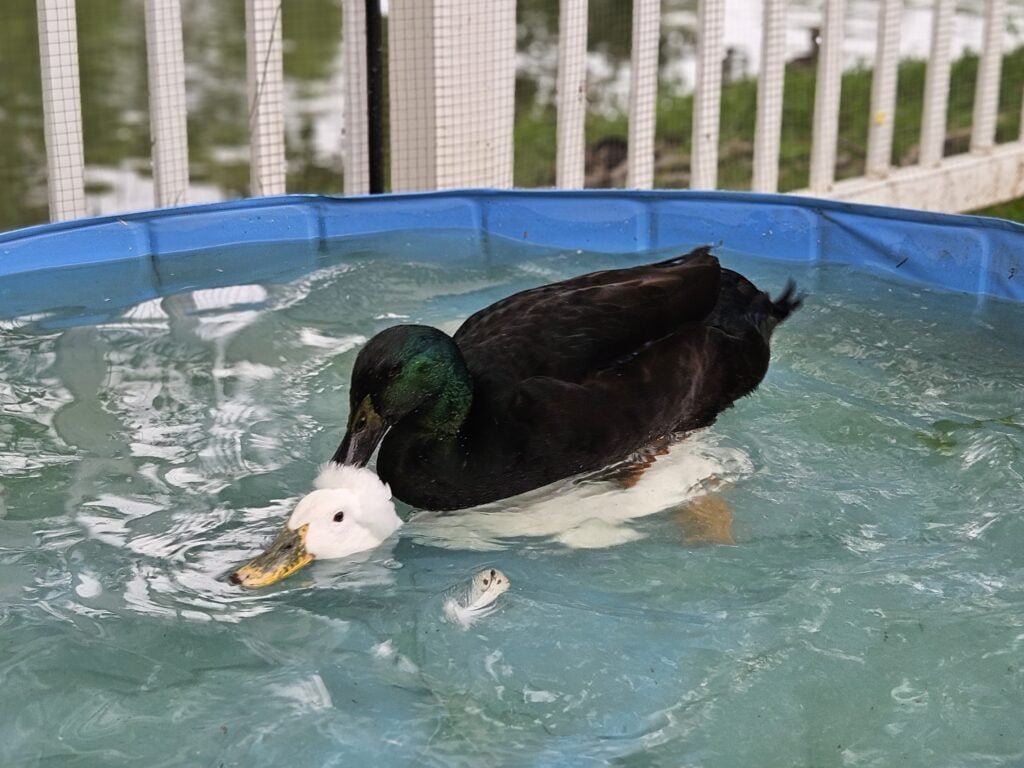
4. Overcrowding
Limited space can lead to stress and aggression as ducks are forced into close quarters.
- Why it happens: Ducks need room to forage, bathe, and retreat from one another. Overcrowding removes this option, increasing competition for space, food, and water.
- Signs of overcrowding: Ducks may jostle for position, fight more frequently, or begin picking on weaker members of the flock.
5. Lack of Resources
Resource scarcity can cause both aggression and bullying, as dominant ducks compete to secure essentials like food, water, and nesting areas.
- What to watch for: Dominant ducks may guard feeding stations or nesting boxes, preventing others from accessing them. Bullied ducks may become malnourished or fail to thrive.
- Why it happens: Ducks naturally prioritize their survival, so they may become territorial over limited resources.
6. Illness or Injury
Ducks often bully or peck at sick or injured flock members, which is rooted in their survival instincts.
- What it looks like: A sick or injured duck may be isolated, pecked at, or chased. These behaviors can quickly escalate, leading to serious harm.
- Why it happens: Ducks instinctively seek to distance themselves from weaker members to avoid attracting predators or spreading disease.
Addressing the root causes can manage aggressive behaviors, including bullying. Ensure adequate space, resources, and a balanced flock composition, and monitor interactions closely for signs of distress. By making thoughtful adjustments, you can create a more harmonious and healthy environment for your ducks.
Steps to Stop Ducks from Fighting
When ducks in your flock are fighting, it’s crucial to address the issue promptly to avoid injuries, stress, and disruption to their social structure. Here’s a step-by-step guide to help you stop ducks from fighting and create a peaceful environment for your flock:
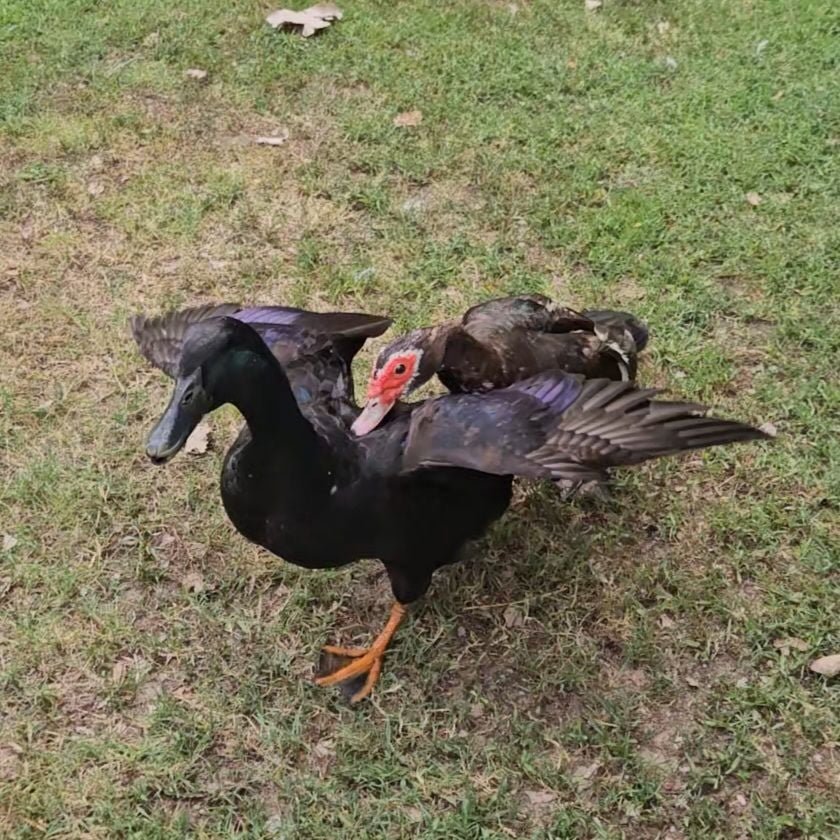
1. Identify the Cause of the Fighting
The first step in resolving conflicts is understanding why your ducks are fighting. Observe their behavior to pinpoint triggers such as:
- New flock members are disrupting the pecking order.
- Overcrowded living conditions.
- Resource competition for food, water, or nesting areas.
- Breeding season hormones in drakes.
- A sick or injured duck attracts aggression.
Knowing the cause will help you take the appropriate actions to mitigate the aggression.
2. Provide Adequate Space
Overcrowding is a leading cause of stress and aggression in ducks. Make sure your ducks have enough room to forage, roam, and retreat.
- Recommended space: Each duck needs about 4–6 square feet of coop space and 16 square feet of outdoor run space. If possible, allow free-ranging to reduce conflicts.
- Why it helps: More space reduces competition and gives bullied ducks an opportunity to escape aggressive flock members.

3. Ensure Plenty of Resources
Fights often break out when ducks compete for limited resources. To minimize conflict, make sure your flock has:
- Multiple feeding and watering stations: Spread them out to prevent dominant ducks from guarding resources.
- Nesting boxes: Provide one nesting box for every 2–3 ducks to avoid fights over laying spots.
- Access to bathing water: Ducks enjoy bathing, and providing enough water prevents arguments over who gets to swim.
4. Address Breeding Season Aggression
Drakes can become highly aggressive during the breeding season, often targeting other drakes or over-mating females. To manage this:
- Balance your flock: Keep a ratio of 1 drake to 4–6 females to prevent over-mating and fighting.
- Separate aggressive drakes: Temporarily isolate overly aggressive males until the breeding season ends.
- Consider neutering: For long-term management, neutering aggressive drakes may help reduce hormone-driven aggression.
➡️ Learn more about a healthy ratio of ducks to drakes.
5. Introduce New Ducks Slowly
Introducing new ducks to an established flock can disrupt the pecking order and lead to fighting. A gradual introduction process is key:
- Quarantine first: Keep new ducks separated for 2–4 weeks to ensure they’re healthy and free of diseases.
- Fence-line introductions: Allow ducks to see and interact through a barrier before full integration.
- Supervised mingling: Introduce them in a neutral area and monitor closely for aggressive behavior.
➡️ Learn more on how to introduce new ducks to the flock successfully.
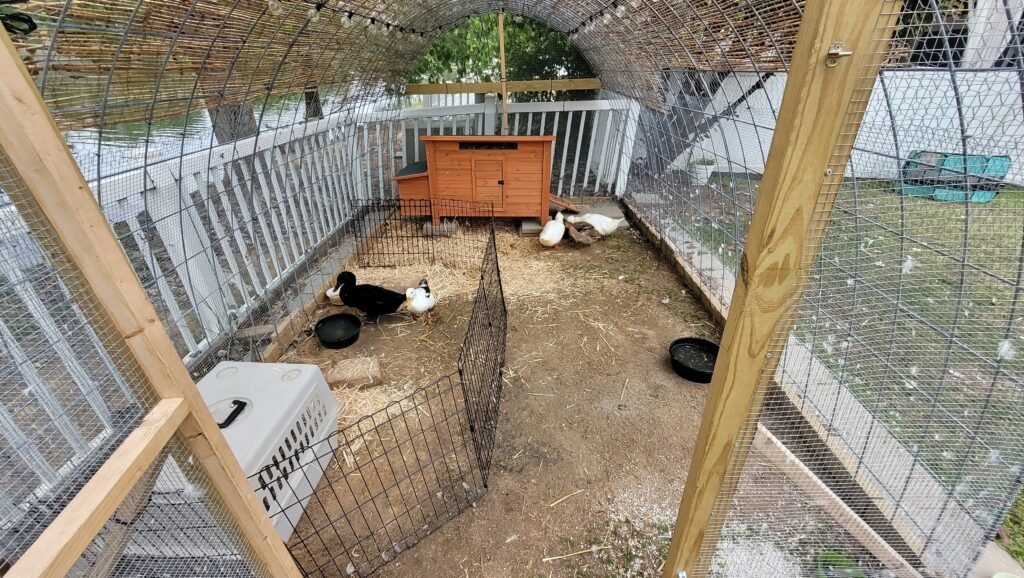
6. Separate Bullied Ducks
If a duck is being consistently bullied, it’s important to intervene before the situation worsens.
- Create a safe space: Remove the bullied duck temporarily and provide it with a separate area to recover.
- Reintroduce gradually: Once the bullied duck regains confidence, reintroduce it using the same slow-integration methods used for new flock members.
7. Reduce Stressors in Their Environment
Environmental stressors like loud noises, sudden changes, or predators can make ducks more aggressive. To reduce stress:
- Keep their environment calm and quiet.
- Protect the flock from predators by securing the coop and run with fencing and roofing.
- Establish a consistent feeding and cleaning schedule to maintain routine.
➡️ Learn how to keep your ducks safe from predators.
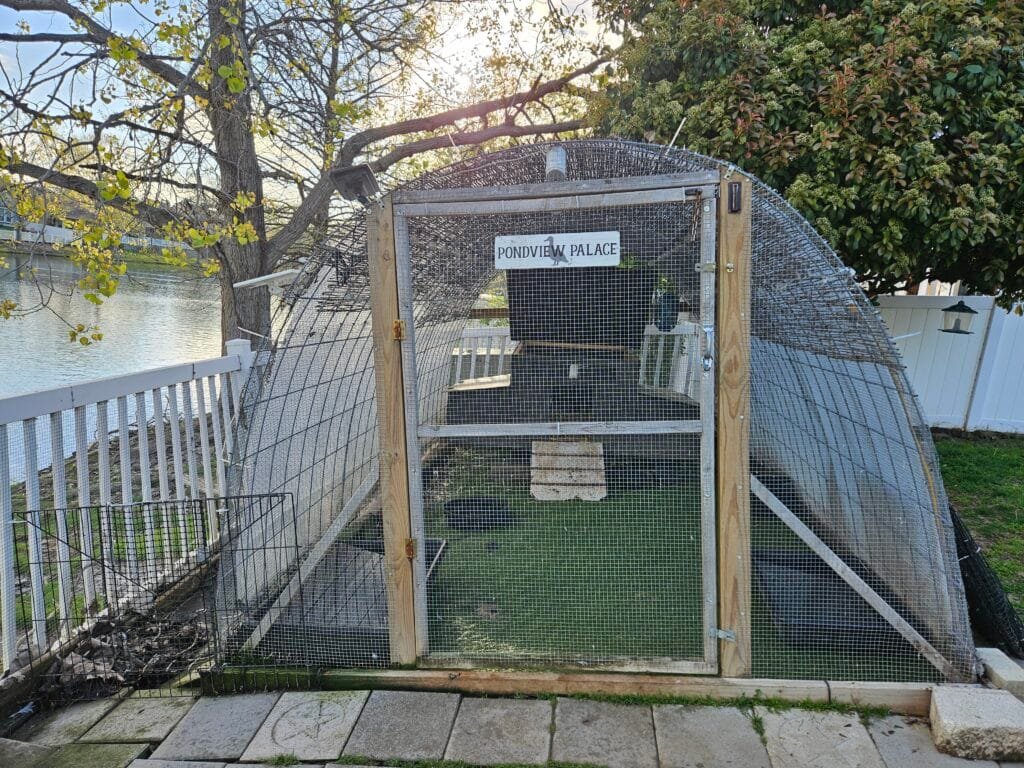
8. Treat Injuries and Illness
Sick or injured ducks are often targeted by others in the flock. Take these steps:
- Isolate the affected duck: Remove it from the flock to prevent further bullying.
- Provide treatment: Address the illness or injury with proper care or veterinary assistance.
- Reintroduce carefully: Once the duck has recovered, reintroduce it gradually to prevent renewed aggression.
➡️ Learn how to conduct a duck health check.
9. Use Distraction Techniques
If fights break out frequently, you can distract your ducks to redirect their energy:
- Scatter treats: Toss a small amount of their favorite treats around the run to keep them occupied.
- Provide enrichment: Add activities like forage mats, toys, or extra bathing pools to reduce boredom, which can lead to aggression.
10. Monitor and Adjust as Needed
Duck aggression isn’t always resolved overnight. Continue observing your flock to ensure conflicts don’t escalate.
- Track aggressive ducks: Identify persistent troublemakers and consider long-term solutions like rehoming.
- Adjust flock dynamics: If one duck or drake is repeatedly aggressive, separating or removing them may be necessary for the health of the flock.
By addressing the root causes and making thoughtful changes to your ducks’ environment, you can create a harmonious and stress-free home for your flock. Do you have specific situations with your ducks that need attention? Let me know, and I’d be happy to help!
Tips for Long-Term Harmony
Once the immediate issues causing fights have been resolved, it’s essential to take proactive measures to maintain long-term peace among your ducks. These strategies will help reduce stress and prevent future conflicts, creating a stable and harmonious environment for your flock.
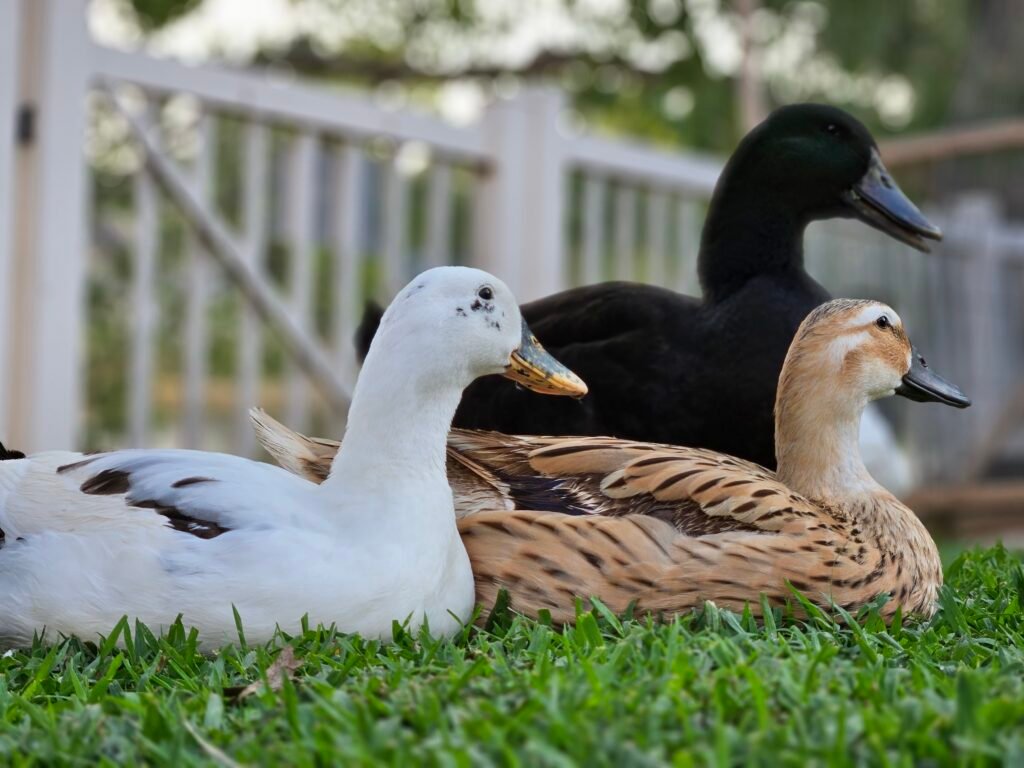
1. Maintain a Balanced Flock Composition
The dynamics of your flock play a significant role in how well your ducks get along.
- Drake-to-hen ratio: Keep a ratio of 1 drake to 4–6 hens to minimize aggression and over-mating. Too many drakes can result in relentless fighting and stress for females.
- Size matters: Avoid mixing significantly larger breeds with smaller ones, as size differences can lead to bullying or injury.
- Temperament compatibility: Some duck breeds are naturally more docile, while others can be assertive. Understanding their personalities will help you build a cohesive flock.
➡️ Learn more about a healthy ratio of ducks to drakes.
2. Provide Enrichment Activities
Ducks thrive in environments where they have opportunities to engage in their natural behaviors. Keeping them mentally and physically stimulated can reduce boredom-related aggression.
- Foraging opportunities: Scatter grains, peas, or leafy greens around their run to encourage natural foraging.
- Bathing options: Ducks love water, so providing a clean pool or pond helps them release pent-up energy.
- Toys and activities: Introduce hanging greens, forage mats, or mirrors to keep them entertained.
Pro Tip: A Delicious Distraction for Ducks
One of our favorite ways to keep the peace and provide enrichment is with the grubs from Grubbly Farms! These high-protein treats are a hit with our flock and serve as the perfect distraction when tensions rise. Tossing a handful of these nutritious snacks can redirect your ducks’ attention during stressful situations, like introducing new flock members or breaking up minor scuffles.
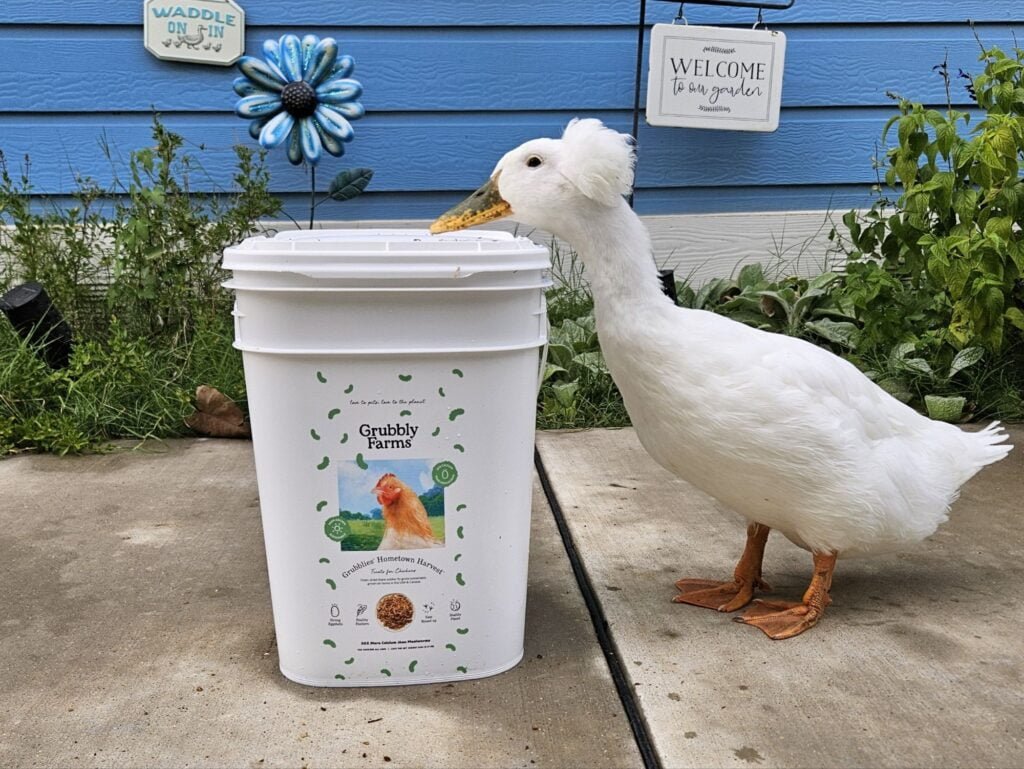
Not only are Grubbly Farms grubs irresistible to ducks, but they’re also packed with nutrients that support healthy feathers, strong eggshells, and overall well-being. Plus, they’re a sustainable choice—good for your flock and the planet!
Whether you need a quick fix for bickering or just want to treat your ducks, these grubs are a go-to solution we can’t recommend enough. Your ducks will love them, and you’ll love the calm they bring to your flock!
3. Optimize Their Living Space
A well-designed living environment reduces stress and gives ducks space to coexist peacefully.
- Run and coop design: Ensure plenty of hiding spots, like bushes or small shelters, where ducks can retreat if they feel threatened.
- Separate areas: Use fencing to divide the run temporarily if certain ducks need space from one another.
- Nesting areas: Provide at least one nesting box for every 2–3 hens to avoid disputes over laying spots.
4. Feed a High-Quality Diet
A nutritionally balanced diet keeps your ducks healthy and less prone to irritability.
- Complete feeds: Provide age-appropriate duck pellets or crumbles fortified with necessary vitamins and minerals.
- Ample feeding stations: Place multiple feeders and waterers around the area to prevent dominant ducks from guarding resources.
- Supplemental treats: Offer occasional treats like fruits, vegetables, and mealworms to add variety without overfeeding.
➡️ Read more about commercial duck feed.

5. Keep a Consistent Routine
Ducks are creatures of habit, and sudden changes can lead to stress and aggression.
- Feeding schedule: Feed your ducks at the same times each day.
- Cleaning routine: Maintain a regular cleaning schedule to keep their living environment fresh and reduce the risk of illness.
- Bedtime routine: Close up their coop at the same time every night to establish a predictable end-of-day routine.
➡️ This is our daily routine with the ducks.
6. Monitor Their Health Regularly
Healthy ducks are happier and less likely to cause trouble within the flock.
- Regular health checks: Look for signs of illness or injury, such as limping, lethargy, or changes in behavior.
- Treat early signs of illness: Address health issues promptly to prevent bullying or worsening conditions.
- Deworming and parasite control: Keep up with preventative care to avoid the stress and irritation caused by internal or external parasites.
➡️ Learn how to conduct a duck health check.
7. Rotate Flock Members When Necessary
Sometimes, certain ducks just don’t get along.
- Rehome aggressive ducks: If a particular duck consistently disrupts the flock’s harmony, consider finding it a new home.
- Isolate chronic bullies: Separating aggressive ducks for a while can sometimes help reset their behavior.

8. Adjust for Seasonal Changes
Ducks’ behavior can change with the seasons, especially during breeding and molting periods.
- Breeding season: Take extra precautions with drakes, such as separating or reducing their numbers.
- Molting period: Ensure ducks have enough protein to support feather regrowth, as molting can make them irritable.
➡️ Learn more about duck molting.
9. Observe and Learn From Your Ducks
Spending time with your ducks allows you to understand their unique personalities and interactions.
- Daily observation: Watch for changes in behavior that could signal brewing tensions.
- Know your flock: Recognizing which ducks are dominant or shy helps you intervene appropriately.
10. Build Trust with Your Ducks
Ducks that feel safe and comfortable around you are less likely to act out aggressively.
- Gentle handling: Interact with your ducks calmly to build their trust.
- Positive reinforcement: Offer treats or spend quiet time near them to create a bond.
- Reduce fear triggers: Avoid sudden movements or loud noises that could startle them.
➡️Learn how to get a duck to trust you.
By implementing these long-term strategies, you’ll foster a calm, cooperative flock that thrives together. Each duck is unique, so it may take time to find the perfect balance—but the reward is a happy, quack-filled flock! Do you have specific challenges or success stories with your ducks? I’d love to hear them!
When to Seek Professional Help
If aggression persists despite your efforts, consult a veterinarian or a duck behavior expert. Chronic aggression might indicate underlying health issues or hormonal imbalances.
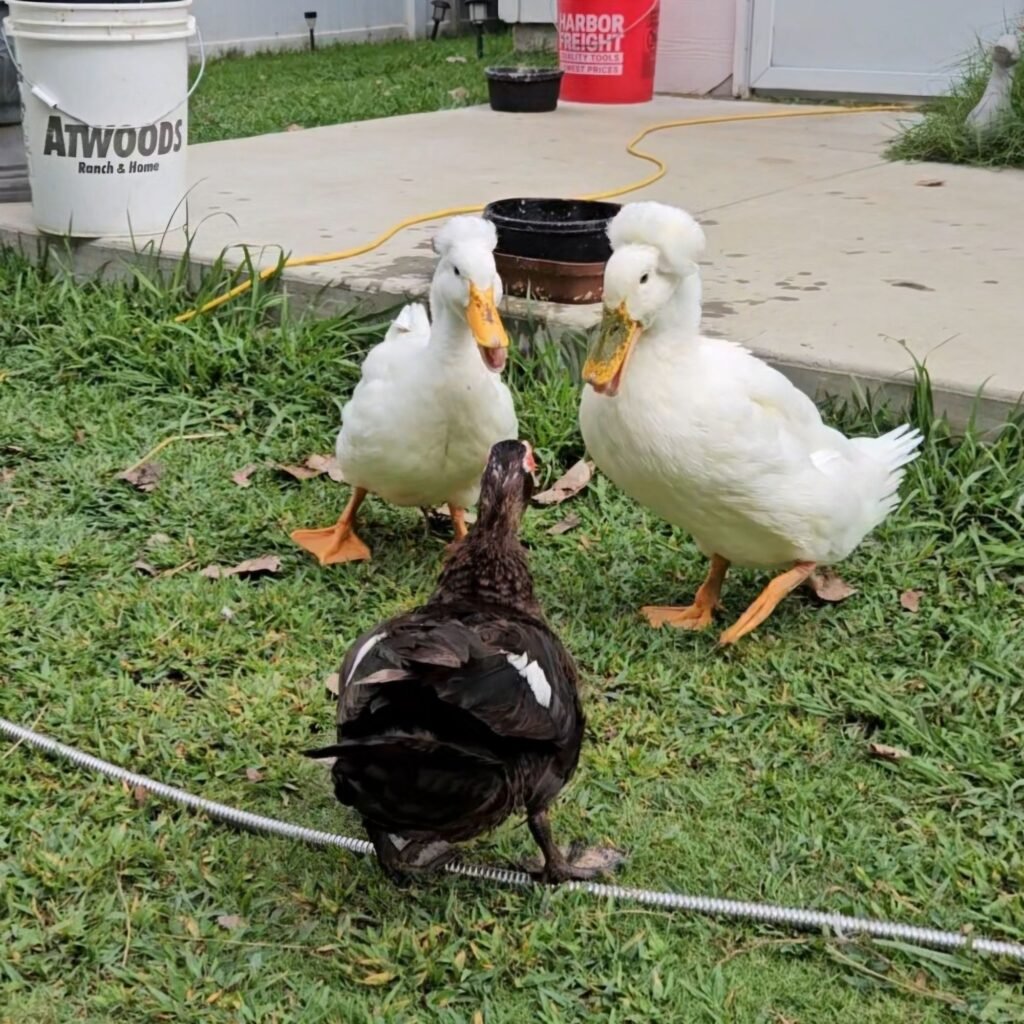
FAQs About Aggressive Ducks
Why are my ducks fighting all of a sudden?
Sudden fighting can occur due to changes in their environment, such as the introduction of new ducks, overcrowding, or limited resources like food or nesting areas. Hormonal shifts during breeding season or the establishment of a pecking order can also lead to aggression.
Can I keep multiple drakes together?
It’s possible, but multiple drakes often fight, especially during breeding season or if there aren’t enough hens to share. To reduce conflict, maintain a ratio of 1 drake to 4–6 hens and provide plenty of space.
Why is one duck bullying the others?
Bullying often stems from dominance issues or a lack of resources. Overcrowding, insufficient food and water stations, or injuries can also trigger bullying. Ensure there’s enough space, food, and hiding areas to reduce tension.
How do I stop one duck from picking on another?
Separate the bully temporarily to allow the victim time to recover. Increase space, add enrichment activities, and ensure resources like food and water are plentiful and spread out.
What can I do if my drake is too aggressive?
If your drake is overly aggressive, especially toward hens, you can separate him temporarily or permanently. Hormone-related aggression during breeding season may subside on its own, but rehoming or reducing the number of drakes might be necessary in extreme cases.
Can aggressive ducks hurt each other?
Yes, aggressive behavior can lead to injuries like feather plucking, bites, or even severe wounds. Monitor your flock closely and separate ducks if fights become dangerous.
Will ducks stop fighting on their own?
Sometimes, ducks resolve conflicts naturally, especially if they are establishing a pecking order. However, if fighting persists or leads to injuries, intervention is necessary to restore peace.
Do certain breeds fight more than others?
Some breeds are more docile, like Pekins and Cayugas, while others, like Muscovies or Runner Ducks, can be more assertive. Understanding your ducks’ breed traits can help you manage flock dynamics.
How much space do ducks need to reduce fighting?
Each duck should have at least 4–6 square feet of coop space and about 16 square feet of outdoor run space. More space is always better to reduce competition and stress.
Should I rehome an aggressive duck?
If a duck consistently disrupts flock harmony despite interventions, rehoming might be the best option for both the duck and the flock.
Can aggressive behavior be seasonal?
Yes, aggression often increases during breeding season when hormones are high, particularly in drakes. Aggression usually subsides once the season ends.
How do I reintroduce ducks after separating them?
Reintroduce ducks gradually by keeping them in separate enclosures where they can see each other without direct contact. After a few days, supervise interactions in a neutral space to ensure they get along.
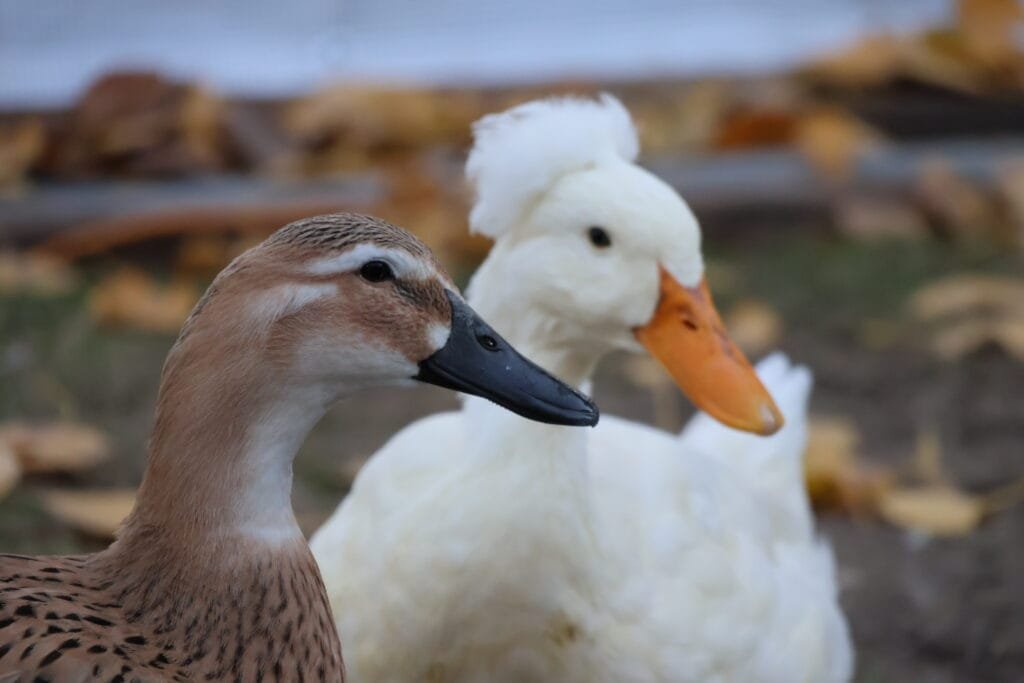
Wrapping Up: Ensuring a Calm and Happy Flock
Managing aggression in ducks can be a challenge, but with the right approach, you can restore peace and create a harmonious flock. By understanding the causes of aggression, taking steps to prevent fighting, and implementing long-term strategies for well-being, your ducks can live happily together. Remember, patience and consistency are key when working with your flock.
And if you’re looking for a fun and healthy distraction for your ducks, don’t forget about Grubbly Farms grubs! These tasty treats are a great way to keep your ducks engaged while helping to prevent squabbles.
Every flock is different, but with the right care and attention, your ducks will thrive in a peaceful and supportive environment.
If you have more questions about managing aggressive ducks, feel free to ask! Remember, every flock is different, and patience is key to fostering harmony.
